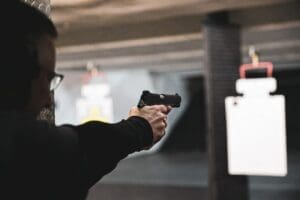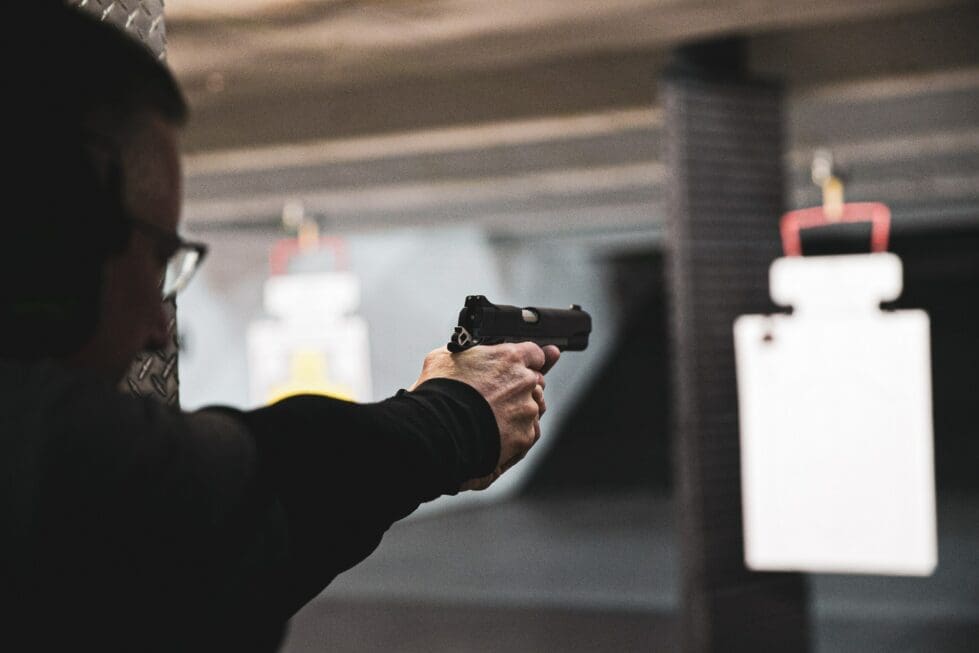

A handgun permitting bill passes House committee after extensive public comment.
More than 35 people, including National Rifle Association members, shooting survivors, libertarians and gun violence activists spoke passionately about a proposed handgun permitting bill Wednesday.
Senate Substitute 1 for Senate Bill 2, sponsored by Senate Majority Whip Elizabeth Lockman, D-Wilmington, would require a person to acquire a permit before they can purchase a handgun, but exempting active or retired police officers, and people with concealed carry permits.
William Sharp of Sussex County said that all the lawmakers who vote for the handgun bill are traitors to the country.
“At this time, I have no other options but to charge these individuals who have submitted this legislation with crimes against the people of Delaware and the Constitution of the United States,” Sharp said. “The first charge is treason. The second is…violation of oath of office.”
Avery Jones, who was at the Christiana Mall during the shooting, said the bill would help to prevent people from getting firearms who shouldn’t have them.
“I would love to see psychologists in schools. But yeah, right now we don’t have that,” Jones said. “I think that this bill in particular is the most proactive step to keeping firearms out of the hands of individuals that do not need them.”
Larry Mayo, with the Institute of the Constitution, said the representatives don’t have the right to pass the handgun bill.
“Can any member of this body produce your permit or license to create legislation outside of your constitutional authority? Question two, can a court created by Article IV (of the U.S. Constitution) give you that permit or license? The obvious answer to both of these questions is no, which means what you’re doing is unlawful. You’re not making a law. You’re breaking law.”
The House Judiciary Committee voted one in favor and five on its merits for the bill on Wednesday. The bill already had passed the Senate along party lines on May 2.
Related Story: Hurry up and vote: Handgun permit bill passes through Senate
House Majority Whip Melissa Minor-Brown, D-New Castle South, said she wanted to clarify a few things about what the bill doesn’t do.
“This legislation will not create an unfair burden on the poor,” Minor-Brown said. “Prospective buyers will not be charged an application fee under this bill. And you do not need a new permit for every purchase…And it’s important to note that getting training every five years helps keep gun owners proficient.”
Rep. Jeffrey Spiegelman, R-Townsend/Hartly, said that the state is having a hard time hiring more social workers so it doesn’t seem like they would be able to hire more officers under the bill, which is expected to cost Delaware $7.8 million a year by 2026.
“When we have heard across the board that we don’t have enough social workers, which would absolutely positively have a beneficial effect on all of the things that Rep. Minor-Brown is trying to prevent…now we have 38 full time employees being dedicated to something that would not have as positive an effect, if an effect at all,” Spiegelman said.
John Lott, president of the Crime Prevention Research Center, said similar handgun bills passed in other states have had negative consequences.
“Maryland instituted its licensing rules in October 2013,” Lott said. “If you compare the murder rates, for example, between 2020 and 2018, Maryland’s murder rate increased four times faster than the national murder rate over that period of time…If you look at either Connecticut or Missouri…I don’t think it’s had any beneficial impact in terms of suicide rates.”
Alison Shih, representing Everytown for Gun Safety, said there are other statistics that show Lott is incorrect.
“There was a significant study in 2019, and it found that permit to purchase requirements were associated with a 21% lower firearm homicide rate in large cities, and 20% lower firearm homicide rates in suburban and rural areas,” Shih said. “There was a 2015 study that estimated that Connecticut permit to purchase law was associated with a 40% reduction in the state’s gun homicide rate during the first 10 years of the law was in effect.”
Rep. Bryan Shupe, R-Milford, said that for felonies committed with a gun, on average, 60% of the weapons charges were dropped. Shupe is the CEO of Delaware Live.
Kristine Iannelli, legislative director of the Delaware Department of Justice, said Shupe’s statistic is misleading.
“[C]harge level statistics rather than case level statistics are incredibly misleading. As many of us know, a single case may involve 10, 11 charges,” Iannelli said. “At some point in the course of that case, some of those charges will fall out, they’ll be dropped and that is in support of the stronger charges that we’ll keep those dangerous people in prison for longer.”
Under the bill, someone must be 21 years old or older and can’t otherwise be prohibited from buying a gun because there’s probable cause the buyer could do harm to themselves or others in order to get a permit.
They also must have completed a firearms training course within the last five years.
That training must include instructions on safe handling of firearms and ammunition, safe storage of firearms and ammunition, and child safety.
It must include shooting fundamentals and skills, a review of state and federal laws, self-defense and confrontation management.
The training must also include live-fire shooting exercises conducted on a range using at least 100 rounds of ammunition.
The bill allows for those making at or below 200% of the federal poverty level to be compensated in full by the state for the cost of the training courses.
Based on the fiscal note for the bill, it would cost $2,820,942 in the 2024 fiscal year from one-time and recurring costs, $7,824,282 for the 2025 fiscal year, and $7,779,736 for the 2026 fiscal year due to recurring costs.
Those costs come from hiring and retaining, in the first year two more Delaware State Police sergeants, one assistant director, one forensic fingerprint technician Supervisor, five intelligence analysts, and one network technician.
In the second year, $6,781,703 would be allocated for eight Delaware State Police troopers, two senior forensic print examiners, two forensic fingerprint technicians, 15 intelligence analysts, and one equipment mechanic.
The fiscal note assumes there will be 84,750 applications for the permits annually.
The bill has 20 additional sponsors and cosponsors, all of whom are Democrats.
During public comments, 25 people spoke against the bill, including libertarians and representatives of gun groups, and 12 people spoke in favor of it, including several members of Everytown for Gun Safety and one person who was at Christiana Mall April 8 when three people were shot.
The bill is now assigned to the House Appropriations Committee, a normal procedure for this type of bill.
Share this Post



